How to Stop the Self-Sabotage

We advance when we’re willing to stretch ourselves further than anything we’ve ever done. But it’s prickly and sticky there. Risky. We might fail. Yes. Fail. Hmmm. And then what? Did we die? Get physically hurt? Lose anything of great measure? Likely not. But we do have our feelings to deal with. So we allow them. These two are the hardest:
1. Judgment from others.
2. Self-judgment.
What really holds us back is perceived judgment that comes from perceived failure - from practicing failure in our heads before it happens.
When we turn away from the discomfort of difficult emotions, unfortunately we armor up with self-sabotage traits of perfectionism, assumptions, comparisons, expectations, more judgment and busyness which only lead to exhaustion, hopelessness and disappointment.
When we notice the judgment and accept that “this is just me judging” without self-criticism (What is wrong with me that I can't stop doing this?) and that although it’s not our true north, judging-compa...
When You've Been Through a Lot and Feel Alone
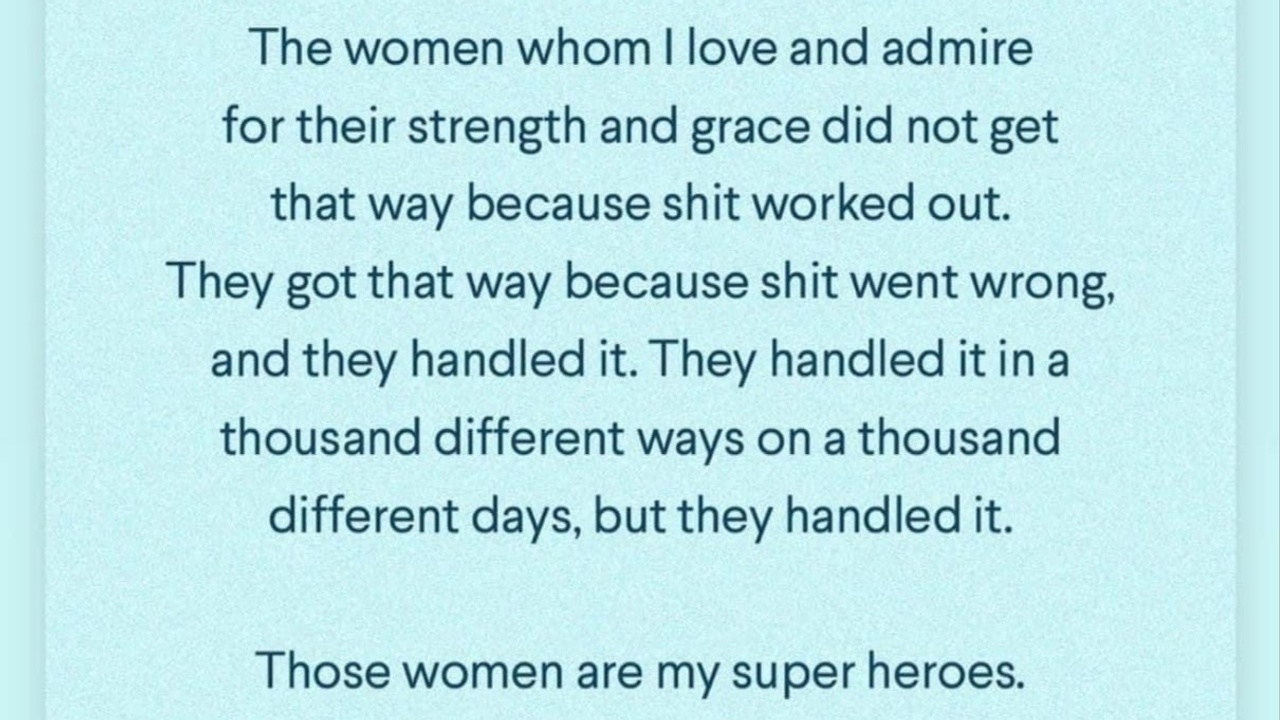
You know who you are, super heroes.
Here’s to you for not sitting back, for not whining, for making it work despite the odds, for taking risks in the face of doubt, for holding true to your priorities sometimes at the detriment of yourself, for having vision and finding a way, for listening and caring when you thought you had little to give, for being gentle with yourself when it seemed nobody was.
Here's to you for failing and starting again this time with wisdom, for swapping assumptions for the truth, for not letting comparison distract you from your goals and achievements, for wearing all the hats even when they didn’t all fit, for not needing to be right but for getting it right, for not being perfect but still awesome.
Here's to you for lying awake at night worrying about things outside of your control and accepting that no matter what happens you’ve got this, for understanding that judgment only makes you judge yourself far worse, for having the courage to face hurtful feelin...
Remove This
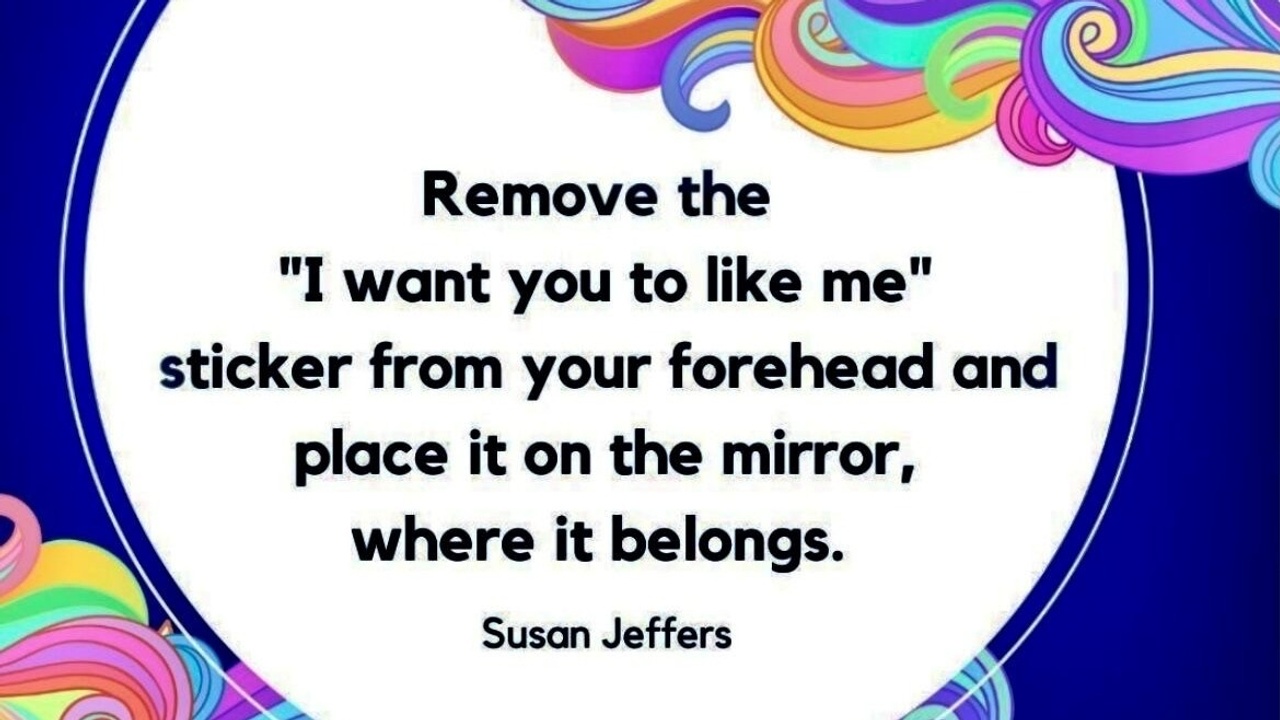
Dear Friend,
This image is so powerful to me. I’ve been an executive coach for more than 10 years and in everyone I’ve ever managed or coached I see a common theme coined by Mary Kay Ash that everyone wants to feel important. The more people seek validation of their relevance externally the more they are on the treadmill to nowhere. Imagine if you could feel important internally - knew that you were valuable and stopped seeking affirmation from outside sources. You’d show up differently - more at ease, less needy, more confident, less judgmental, more yourself. That’s the shift to freedom.
People often ask me, “How do you know if you have executive presence?” I tell them, “You have an understanding and acceptance of yourself with all your strengths and opportunities, know you have much to contribute, are curious and have a greater desire to get it right than to be right.”
Here's a short video I recently made if you are considering if executive coaching is right for you. This video ...
Not in Your Resume

People ask me all the time to look at their resume to which I suggest they step back and craft a resume based on a career plan that takes into account their transferable skills, measurable key accomplishments and fits into an overall comprehensive structure that ties together companies that match your values, ways to market your value proposition and a voice that speaks your unique career stories.
This is the document I give my clients to help create that synergy. Don’t have an accidental career. Often more planning goes into a vacation than a 40 year career or a 90 year life. Success is freedom. Not more hours. You deserve fulfillment.
I am giving away this new executive career planning tool I give to my clients because so many people are suffering with anxiety about the future right now and need direction. Don't wander without direction. Be purposeful. >>> Eight Tip Career Plan When You're Not Sure What Industry or Position.
If you don't know where you'll be at the end of the year...
Psychological Safety at Work
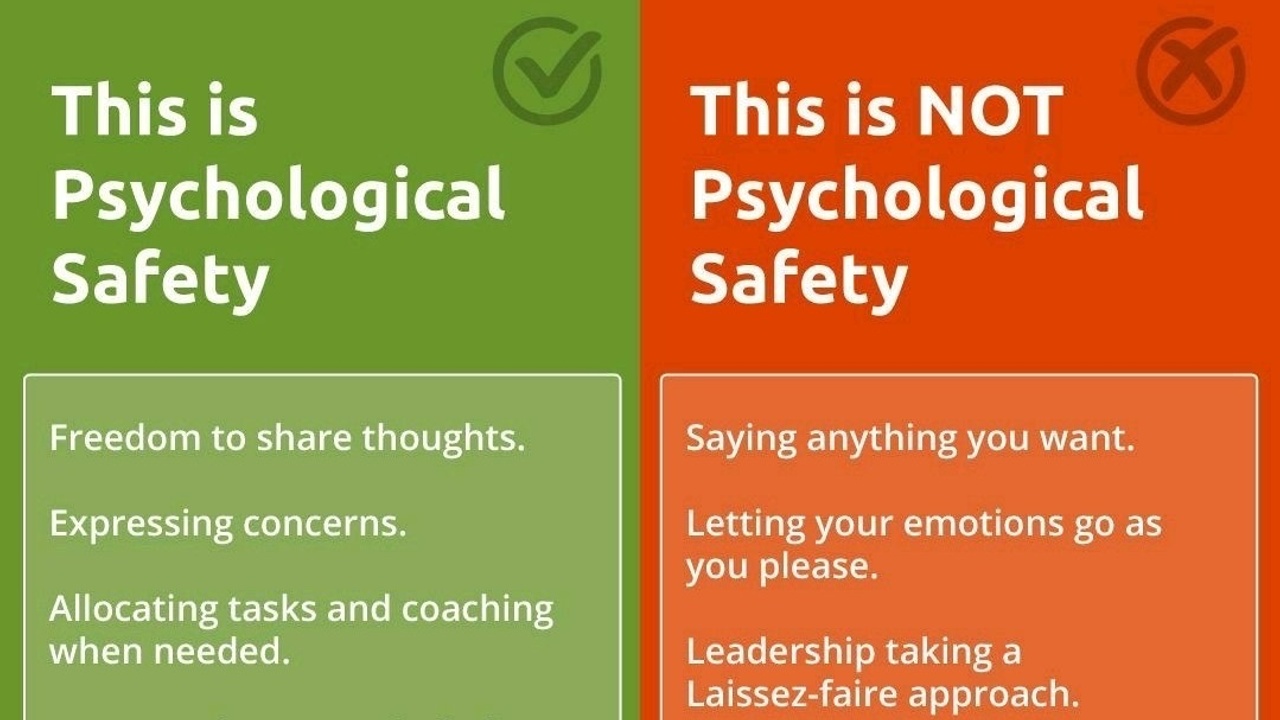
When a team feels they have psychological safety at work they’re not experiencing cynicism, personal agendas, bureaucracy and posturing. It’s up to us as leaders to provide that.
How?
By working on ourselves. The answer is not in a book or a training or a conference. It’s inside of you.
When we can go into the dark corners of our lives and root out what holds us back - what makes us insecure, we stop doing and tolerating these culture killing and self-defeating behaviors.
When we can stand our self-doubt up against our courage we make space for the truth - that we are all human and better when we support each other.
When we can accept that we’re not perfect especially in the face of regret, we soften to ourselves and then to others.
Nothing is permanent. We’re all a work in progress.
The human condition is happy when it feels safe and accepted. You deserve to be safe. You deserve the promotion or new job. You deserve love and healthy relationships. You deserve to thrive.
...Releasing What No Longer Serves You

Releasing what no longer serves you it is harder than seeking what does because the answer is inside us, not external. It is far easier to blame and look outside of ourselves for a reason than own our part in the chaos.
Release requires awareness and humility. It demands giving up control. It calls us to name what we’re feeling that is in the way. It insists that we stand naked with vulnerability and say, “This is scary. I feel alone and without power here.” And then you breathe. And breathe again. And breathe again. And you realize the world didn’t end, you’re still alive and that something has changed. You feel lighter.
And you ask yourself why you didn’t do that earlier. Why you wasted so much time in misery. It’s because you weren’t ready.
Wishing you readiness today.
If you want more executive presence tips here’s a link to my FREE report: 31 Success Practices for Leaders in the High Stakes Corporate World
Your coach,
Mary Lee
P.S. Feel f...
Lack of Boundaries Kills Dreams

Short and sweet today because enough said in a few words.
You know someone has poor boundaries when they expect far more than they give and you end up feeling that you’re not enough. We have to draw boundaries around ourselves for our own self-preservation, executive presence and sanity. Boundaries start with being able to say, “No” or removing yourself from a conversation that goes nowhere.
Don't show them your worst side in defense of what is not yours to own. Don't let them shed their pain on you. It's not about you. You need not respond at all. Silence says everything.
If you want more executive presence tips here’s a link to my FREE report: 31 Success Practices for Leaders in the High Stakes Corporate World
Your coach,
Mary Lee
P.S. Feel free to forward this email to someone who could benefit from it. We are all walking down the same road in life looking for a hand to hold. Sometimes we must be the hand that reaches out.
Mary Lee Gannon, ACC, CAE i...
The Call at the Door

Did you ever see images like this one and say, “but I really do want that promotion (new job, better relationships with my team, love in my life, connection with my family, etc.)”
“…it isn’t your door” doesn’t only mean that the door isn’t right. It also means that maybe you’re not in the right space to open that particular door. Maybe you’re more positioned to open doors that are congruous with the energy you put out in the world - doubt doors, undervalued doors, not good enough doors.
Those doors typically lead to more of the same - frustration, self-sabotage, perfectionism, disappointment, frayed relationships.
Achievers believe that if they just work harder things will get better because that strategy always served them. The truth is that plan, while a tenet of good character, isn’t a differentiator at the executive level. Everyone works hard there. And sometimes people who aren’t even working as hard as you get promoted over you.
The one thing that I’ve seen missing in cli...
This Shifts You Away from the Hurt
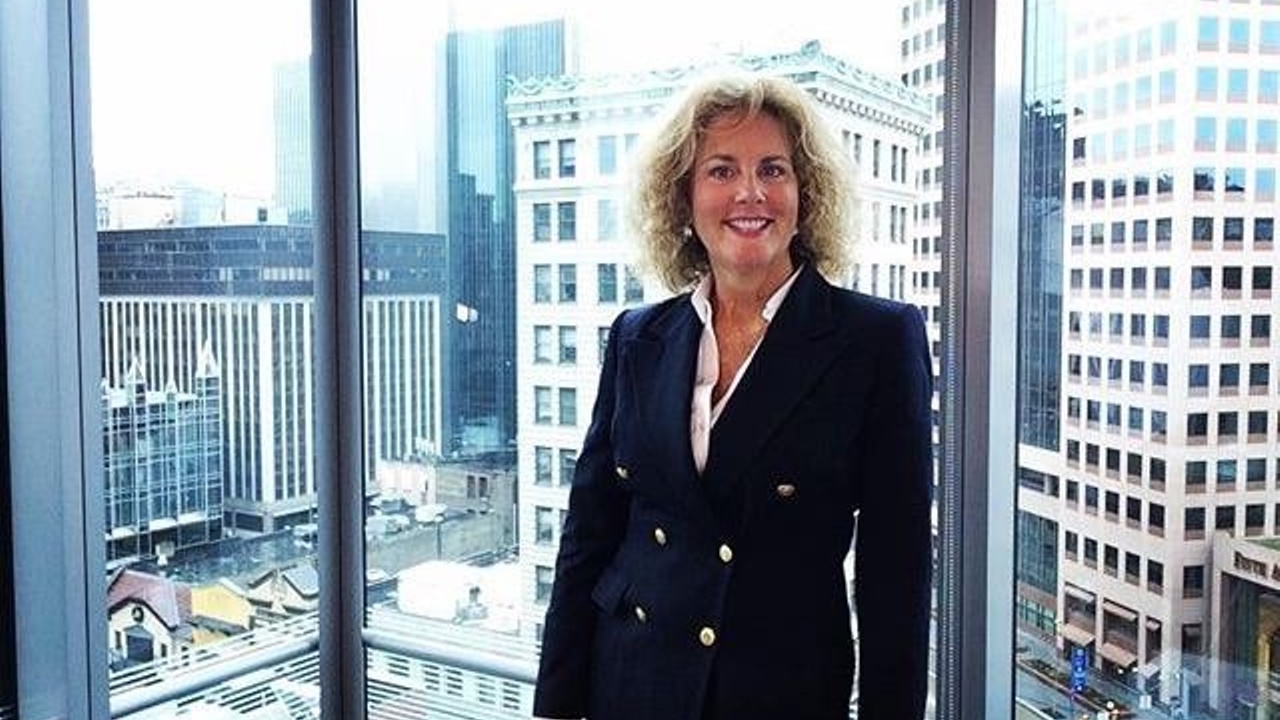
The shift to focusing on the lesson, not the hurt, is crucial for executive presence. It comes by way of building your self-awareness such that you notice your thoughts before you become them. How do we notice thoughts from a third party perspective instead of getting swept up in the emotions that follow? By training the mind to observe itself when not in a crisis.
Mindful daily practices train the mind to stay in the moment and not react with regret.
So build the discipline of mindful practices into your daily routine: read an inspirational passage, do a craft, meditate, take a mindful walk where you notice everything around you and not think about anything else, prayer.
Then watch what how saying or thinking things you used to later regret dissipates. Notice how the people you used to hate become subjects of study. Observe how your words are more productive with people you care about. Others will notice how much more you smile.
For more executive presence tips here's a link to...
I'd Rather Be Happy Then RIght
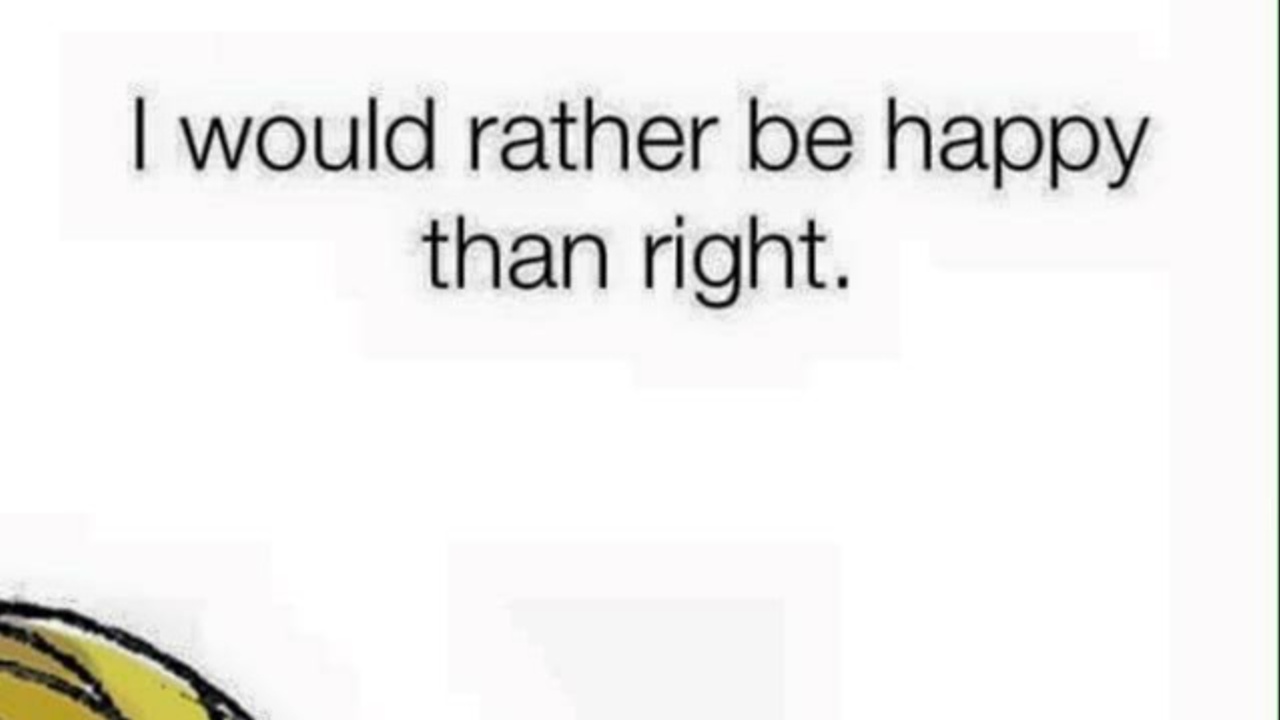
If I learned anything this week it’s that we must cease our need to be right and then listen more than we speak. People want to be happy more than they need to be right. Though often they don’t know it. Be the “rent-an-adult.”
Be the leader who can set ego aside and view the situation from a third party perspective. Winning is not the goal if it’s at the expense of your or another person’s self-esteem. Being right is not sustainable if someone else has to be wrong.
That doesn’t mean to suggest that trying to reason with the unreasonable will build alignment - that arguing with fools will get you anywhere. Sometimes we need to walk away and let the masses isolate them. The pain of staying the same must be worse than the pain of change. The biggest fools end up in a diminishing group and ultimately alone. That’s pain enough.
Ask yourself this question before you speak: “Does what I’m about to say advance collaboration or divide?”
See into the other person’s motivation. “Can I alleviate their...
